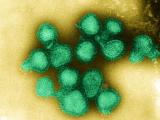Mar 3, 2005 (CIDRAP News) – British regulators have cleared Chiron Corp. to resume making influenza vaccine at its plant in Liverpool, England, which should improve the chances of an adequate vaccine supply in the United States next winter.
British officials suspended Chiron's license to make flu vaccine in October 2004 because of contamination problems at the plant. That forced the company to cancel delivery of 48 million doses of vaccine to the United States, close to half of the nation's expected supply for the 2004-05 flu season.
The United Kingdom's Medicines and Healthcare products Regulatory Agency (MHRA) announced the lifting of Chiron's license suspension yesterday. "The MHRA inspectors have concluded that satisfactory progress has been made in the manufacturing areas which had previously caused concern," the agency said.
The suspension was officially lifted at 5 p.m. yesterday. "The company . . . is now free to recommence full manufacturing of the vaccine," the MRHA said.
The US Food and Drug Administration (FDA) welcomed the announcement but indicated it was not yet certain that the company could supply vaccine for the US market next season.
In a news release, Dr. Jesse Goodman, director of the FDA Center for Biologics Evaluation and Research, said, "FDA considers MHRA's action today an extremely important milestone in Chiron's efforts to supply influenza vaccine for the U.S. market for the coming flu season, but work remains. FDA and MHRA will continue to closely monitor Chiron's progress as manufacturing proceeds.
"When all critical stages of manufacturing are in full swing, and needed corrective actions can be fully evaluated, FDA plans to conduct a comprehensive inspection of Chiron's Liverpool facility to assure that Chiron can produce a safe and effective vaccine."
Chiron, based in Emeryville, Calif., promised to continue working to get the plant back on track. Chief Executive Officer Howard Pien said in a statement, "Our employees have worked tirelessly and we are extremely proud of this result. This is a significant accomplishment. In this new beginning we remain focused on continuing to remediate and improve so Chiron can successfully deliver on the results required to supply influenza for the 2005-2006 season."
The statement did not say how much vaccine the company expects to be able to make. Flu vaccine is grown in chicken eggs; production usually begins in late winter or early spring and takes roughly 6 months.
The loss of Chiron vaccine this season raised the specter of a shortage and prompted the Centers for Disease Control and Prevention (CDC) to recommend that available doses be reserved for people with an increased risk of flu complications. The fear of a shortage triggered long lines at flu-shot clinics last fall.
The nation's other flu-vaccine sources stepped up their production in response to the situation. Sanofi Aventis (formerly Aventis Pasteur) said it would produce an extra 2.6 million doses, for a total of about 58 million doses of inactivated vaccine, and MedImmune planned to make an extra 1 million doses of its live intranasal vaccine, FluMist, for a total of about 3 million.
In addition, the government arranged to buy 1.2 million doses of a GlaxoSmithKline flu vaccine that is not licensed in the United States. The vaccine, though considered safe, was to be used under investigational new drug rules, which require vaccine recipients to sign a consent form.
The nation ended up with an estimated total of about 62 million doses of vaccine. The flu season has turned out be relatively mild, and some of the vaccine supply has gone unused, despite the earlier fears of a shortage.
A CDC official was quoted yesterday as saying about 7% of the approved vaccine doses produced for the US market this year have not been used. Dr. Jeanne Santoli told the New York Times that 3 million to 3.5 million doses of inactivated vaccine and 1 million doses of live vaccine have not been sold.
See also:



















